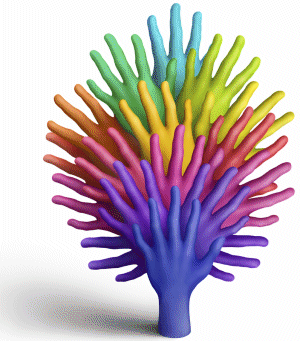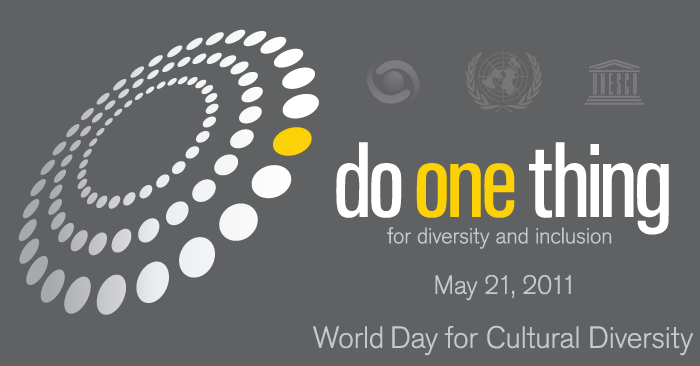Today’s date marks a day in 1960 when the police in South-Africa shot and killed 69 people in a peaceful demonstration against the apartheid pass laws. Although much of the legislation has changed since, millions of individuals and communities are still impaired by the injustice that racism inflicts.
Although much of the legislation has changed since, millions of individuals and communities are still impaired by the injustice that racism inflicts.
Today, on the International Day for the Elimination of Racial Discrimination, people around the world are reminded of the negative consequences of racial discrimination. The first article of the Universal Declaration of Human Rights famously says that “all human beings are born free and equal in dignity and rights”.
Read more.. »
guest |
December 3rd, 2012
Today is the International Day for Persons with Disabilities.
According to World Health Organization (WHO), 15% of the world’s population has a disability. That means one billion people worldwide, out of which 11 million reside in the UK.
The UN first established the International Day for Persons with Disabilities in 1992, and originally the day was called International Day of Disabled Persons. The UN day aims to promote understanding of disabilities worldwide, “and mobilise support for the dignity, rights and well-being of persons with disabilities.” In addition, the day “seeks to increase awareness of gains to be derived from the integration of persons with disabilities in every aspect of political, social, economic and cultural life.”
Each year focuses on a different issue around disabilities. The theme for 2012 is “Removing barriers to create an inclusive and accessible society for all.”
Read more about disability and health, as well as the International Day for Persons with Disabilities, here.
Or, browse the BBC disability blog, Ouch! here.
guest |
October 22nd, 2012
“We stand at a critical moment in Earth’s history, a time when humanity must choose its future.”
Earth Charter

One World Week highlights the values we have in common.
The theme for One World Week 2012 is “Sharing destiny: Moving towards One World”.
One World Week is a UK development education charity with an aim to raise awareness and understanding of cross-cultural and intercultural issues. The seven-day celebration, One World Week, happens annually in October, but there are smaller events happening all year round.
One World Week focuses on commonalities that cultures, nations, and religions have. Issues that One World Week sees are important for all of us are earth and its resources, justice, equality, peace, and mutual respect. This year’s One World Week theme asks how can we best shape our lives to contribute to an equitable future for all.
Read more.. »
The International Day of Democracy was set up to examine the 
state of democracy in our world today. In 2007, the UN General Assembly declared it to be a day to encourage governments to strengthen programmes devoted to the promotion of democracy.
Democracy is a universal value that freely expresses the will of people to determine…
Read more.. »
“What counts in life is not the mere fact that we have lived. It is what difference we have made to the lives of others that will determine the significance of the life we lead.”
– Nelson Mandela

Mandela fought for freedom, peace, and equality.
Today is the fourth year the world celebrates Nelson Mandela Day. On the 90th birthday celebration of Mandela, in Hyde Park in 2008, the UN and the Nelson Mandela Foundation decided that this day should be an annual day to celebrate the life and work of Mandela and of a culture of freedom and peace. The basic idea behind the day is simple: The United Nations calls everyone to give 67 minutes of their day for advocating human rights, whether it means supporting your chosen charity or serving your local community. The 67 minutes are based on the 67 years Nelson Mandela gave of his life fighting for conflict resolution, democracy, human rights, peace, and reconciliation.
Mandela was born in South Africa, in 1918. He became one of the most well-known anti-apartheid activists, and was imprisoned in 1964 for his views. He spent more than 27 years in prison, during which the political climate of South Africa stormed but essentially stayed unchanged. Straight after his release in 1990, Mandela plunged into his life’s work, and in 1991 was elected the first black president of South Africa. In 1993, he was awarded with the Nobel Peace Prize.
Read more.. »
Today is the International Day for Cultural Diversity for Dialogue and Development! Although the name of the day sounds complex, the purpose of this day is fairly simple: to celebrate cultural diversity and help us learn to live together better. In November 2001 UNESCO adopted a Universal Declaration on Cultural Diversity.

Do One Thing for Diversity
The following year, 2002, was the United Nations year for Cultural Heritage and at the end of that year the UN declared may 21st to be the International Day for Cultural Diversity for Dialogue and Development.
Ever since then, May 21st has been celebrated and commemorated through seminars, various educational programs and campaigns, exhibitions, and concerts. A grass-root campaign sponsored by UNESCO, ‘Do One Thing for Diversity and Inclusion,’ is trying to engage the international community through social media. According to the UN Secretary General Ban Ki Moon the campaign is calling for “from youth to policy-makers, from religious leaders to journalists, entrepreneurs and others who shape opinions and trends.”
Read more.. »
guest |
February 20th, 2012
The World Day of Social Justice was established on February 20th in 2009 to promote gender equality, fair employment, social well-being, and justice around the world.
promote gender equality, fair employment, social well-being, and justice around the world.
In his message last year the UN Secretary General, Ban Ki-moon, said:
“Social justice is more than an ethical imperative, it is a foundation for national stability and global prosperity. Equal opportunity, solidarity and respect for human rights — these are essential to unlocking the full productive potential of nations and peoples..”
 Although much of the legislation has changed since, millions of individuals and communities are still impaired by the injustice that racism inflicts.
Although much of the legislation has changed since, millions of individuals and communities are still impaired by the injustice that racism inflicts.






 promote gender equality, fair employment, social well-being, and justice around the world.
promote gender equality, fair employment, social well-being, and justice around the world. Hello, I'm Deborah Swallow and, for the last fifteen years, I've worked in over thirty countries addressing the complexities of people working internationally across multiple cultures, so individuals and organisations alike can gain an authentic competitive edge and win in international markets.
Hello, I'm Deborah Swallow and, for the last fifteen years, I've worked in over thirty countries addressing the complexities of people working internationally across multiple cultures, so individuals and organisations alike can gain an authentic competitive edge and win in international markets. 